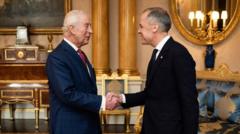In a significant political maneuver, Canadian Prime Minister Mark Carney has extended an invitation to King Charles III to open the 45th session of Parliament, underscoring a burgeoning respect for the Crown while also asserting Canada’s sovereignty amidst US political pressures. This invitation contrasts sharply with Canada's historical shifts away from the monarchy, particularly a decade ago under Conservative Prime Minister Stephen Harper, when the emphasis on royal connections sparked national debate regarding Canada's identity.
In 2011, Harper's decision to replace local artwork with a portrait of the Queen was met with criticism, perceived as an archaic throwback in a nation increasingly eager to carve its own independent path. The subsequent administration of Liberal Prime Minister Justin Trudeau saw a departure from such formalities, signifying a conscious effort to foster a distinct Canadian identity apart from its colonial past.
Fast forward to 2025, Carney’s invitation to King Charles signifies a remarkable reversal in tone, highlighting a desire to reaffirm Canada's royal ties. Canadian royal historian Justin Vovk described this invitation as a profound statement emphasizing the uniqueness of Canada, aiming to demonstrate its distinct identity in the face of perceptions pushed by figures like Donald Trump. Trump's frequent remarks labeling Canada as a potential "51st state" have provoked a defensive nationalism in the country, thereby making Carney's invitation a powerful political statement.
Historically, Canada and the US share colonial roots; however, the former maintains significant ties to the British monarchy, a factor that has evolved alongside Canada's assertion of independence from colonial rule. With the British monarch as the formal head of state, the ongoing duties are typically delegated to the Governor General, reflecting a blend of tradition and autonomy.
The invitation is also timely, coinciding with a critical moment in Canadian politics, particularly following a campaign in which Carney emphasized opposition to Trump’s policies that undermined Canadian autonomy, such as tariffs and various aggressive economic statements. As he remarked when announcing the invitation, the King's visit would serve as "a historic honour that matches the weight of our times," reinforcing Canada’s sovereignty on a global stage.
Despite the royal invitation's potential political significance, many Canadians harbor indifference or skepticism towards the monarchy, particularly amidst ongoing discussions about the Crown’s historical injustices toward Indigenous peoples. In Quebec, political factions such as the Bloc Québécois persist in advocating for disassociating from the monarchy, reflecting ongoing debates about national identity and allegiance.
Nevertheless, the prospect of King Charles's visit excites some Canadians, and aims to bridge the relationship with Trump, who values the monarchy's historical significance. Observers note that enhancing ties with the British monarchy serves as a unifying element that transcends political divides. As Carney seeks to navigate shifting dynamics with the US, he potentially positions Canada to forge stronger relations with European allies, reflecting a broader strategic vision.
This visit marks not only the King’s first trip to Canada as reigning monarch but also a momentous occasion in reinforcing the connection between the Canadian people and their head of state. Although brief, the palace anticipates that this visit will resonate, showcasing a meaningful dialogue between the Crown and a country that has continually asserted its independence.




















